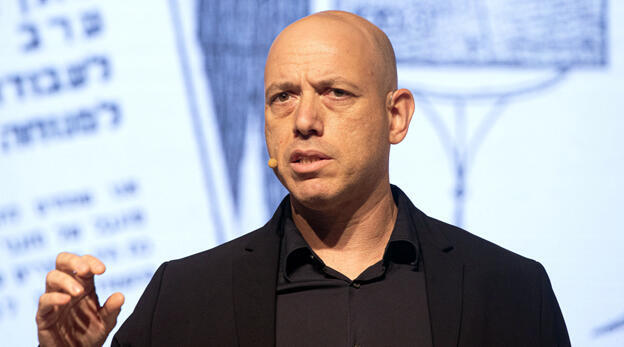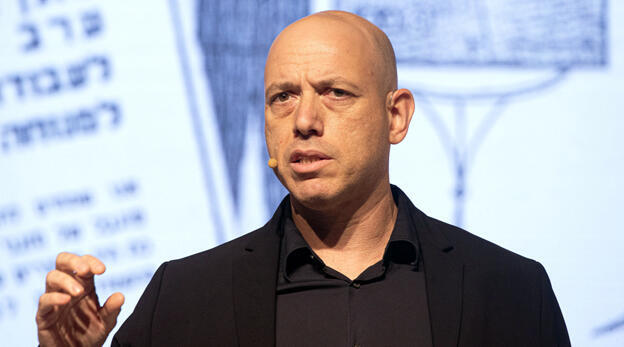
Electra CEO: "The state should impose fewer taxes and encourage more consumption"
Electra Consumer Products CEO Zvika Schwimmer claimed that "the 'What's Good for Europe' reform does not sufficiently address the food industry." According to him, "Carrefour has been profitable for five consecutive quarters and is on a very positive trend going forward."
"Let’s talk about diapers for a moment," said Zvika Schwimmer, CEO of Electra Consumer Products, at Calcalist's 2025 Forecasts Conference held in collaboration with Bank Hapoalim and the Phoenix Group. "A few years ago, I was at dinner with Dr. Zinkann, the owner of Miele, a premium electrical products company and a global leader in its field. He said something remarkable to me: ‘Zvika, Israelis are lucky. Here in Germany, when you go to the supermarket, more adult diapers are sold than baby diapers. In Israel, more baby diapers are sold. And as long as you sell more baby diapers, it means there is growth.’
"Sometimes, you need an outside perspective to confirm what you’ve always known," Schwimmer continued. "In one simple sentence, Dr. Zinkann distilled everything we at Electra Consumer Products believe in. We believe in Israel, in Israeli growth, in the Israeli market, and in the Israeli consumer."
Electra Consumer Products, established almost 80 years ago as a small refrigeration and ventilation company, introduced Israel's first home air conditioners in 1955 and was later acquired by Elco. According to Schwimmer, the company has consistently understood one key truth: Israel is a country that never stops growing.
"A few months ago, I visited Samsung’s headquarters in Seoul, which we represent in Israel," Schwimmer said. "They told me that Israelis lead the world in exposure to new products, that they love innovation and are eager to adopt it. Even in a year of war, we continue to see this. That passion for innovation has been the secret of our growth for years."
Schwimmer emphasized that Electra is no longer just an air conditioner company. "Today, we are one of Israel’s leading consumer product groups, operating in air conditioning, electrical goods, food, sports, leisure, and even financial services, with a credit card in collaboration with Bit and Cal that serves hundreds of thousands of customers."
Discussing the international Carrefour chain, for which Electra is the franchisee in Israel, Schwimmer highlighted its transformation. "We took two struggling chains—Yenot Bitan and Mega—and turned them into an international chain. There’s still work to be done, but we’ve undertaken the largest kashrut project ever in Israel and are opening a new store every week. Today, Carrefour is the second-largest chain in terms of branch count, the fourth-largest in turnover, and the largest urban chain in Israel. It has been profitable for five consecutive quarters and continues to grow, with strong appeal even in the ultra-Orthodox sector."
Schwimmer expressed optimism about Israel’s resilience and economic potential. "People will always need food, electrical goods, and clothing," he said. Referring to a Deloitte report analyzing Israel’s past wars, he noted: "The report shows a short-term decline during conflicts, followed by recovery and economic booms in the medium term. Israel knows how to rebuild itself and emerge stronger after crises. Increased consumption drives a circular economy: consumers spend, the government benefits from taxes, businesses thrive, and wages flow back into the economy."
To further strengthen the economy, Schwimmer called for "lowering tensions, improving security, reducing taxes, and encouraging consumption, which will increase state revenues without burdening citizens."
Schwimmer also addressed the challenges of regulation, praising areas where Israel aligns with European standards, such as in electrical products, which foster competitive prices and a wide variety of brands. However, he criticized regulatory gaps in the food sector. "The reform aligning Israel with Europe in areas like pharmaceuticals and hygiene has been great, but it hasn’t sufficiently addressed food. There’s excessive regulation—like stricter shelf-life testing and labeling rules—which delays processes. It’s time to adopt practices that work well in Europe, like allowing foreign-language labels."
Looking to the future, Schwimmer predicted that tourism and real estate would rebound. "Immigration needs to be encouraged, and Israel remains the safest place for Jews in the world," he said.
Electra, he noted, is committed to supporting reconstruction in regions impacted by the conflict. "After the war, we focused on private customers for air conditioners but also worked to restart construction projects. To rebuild the north and south, we must develop resilience. On the day of the ceasefire, we were among the first to open a Machsanei Hashmal branch in Kiryat Shmona. We also signed an agreement with Carrefour there, believing people will return to these areas."
Schwimmer identified cities like Ashkelon, Netivot, Sderot, Ofakim, Nahariya, Acre, and Kiryat Shmona as having the greatest development potential. "These cities endured the heaviest crises in 2024 but will see tremendous growth in 2026 and 2027. Young families, people who are deeply invested in Israel’s future, will move there, consume locally, and drive economic growth. We are investing in places where the future is being built today."














